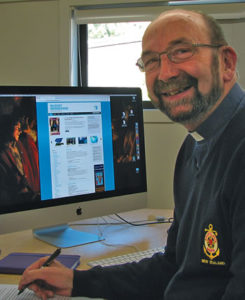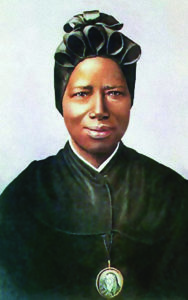8 February: Day of Prayer Against Human Trafficking

Fr Kevin Head SM
St Josephine Bakhita was born in Darfur, Sudan, in 1869. She was nine when she was kidnapped and sold as a slave, so traumatised by the experience that she could no longer remember her name. Her captors named her ‘bakhita', which means 'fortunate'. In 1882, she became the property of the Italian consul, whose family treated her kindly and respectfully. Eventually, she was taken to Italy to work for another Italian family, after which she became a Canossian Sister of the Institute of Catechumens in Venice. Her mission was exercised in “cooking, sewing, embroidery and attending the door”, according to the Canossian Sisters of Venice. There are few sayings attributed to St Josephine, but one of them is, “Be good, love the Lord, pray for those who do not know him. What a great grace it is to know God!”
Josephine’s simplicity and humility deeply impressed people, as did her constant cheerfulness, despite painful years of ill-health. In her final days, memories of her time as a slave caused her to pray, “Please, loosen the chains … they are heavy!” St Josephine died on 8 February 1947.
On her feast day, 8 February, the Church prays especially against the evil of human trafficking, also known as the modern-day slave trade. It is sobering to realise that "nearly every country is a source, transit, or destination, or combination of these three, for trafficked persons”.1
Estimates suggest that 40.3 million people suffer some form of modern slavery.2
These include:
- 10 million children, one in every four victims of slavery
- 24.9 million in forced labour,
- 15.4 million in forced marriage, and
- 4.8 million in forced sexual exploitation.3
Another way of saying this:
There are 5.4 victims of modern slavery for every 1,000 people in the world. Women and girls are disproportionately affected by forced labour, accounting for 99% of victims in the commercial sex industry, and 58% in other sectors.4
We may tend to think that slavery happens in Africa, Europe, Asia, the Middle East, South America – anywhere but here. The fact is that it also happens on our doorstep. There are an estimated 15,000 victims of exploitation in Australia and 3,000 in Aotearoa New Zealand.5 In New Zealand since 2017, for example, Immigration New Zealand has forbidden 366 businesses from recruiting migrant labour for six to 12 months because they have broken employment laws.6 And in a case in September 2019, investigations by Immigration NZ found that an employer owed a migrant worker over $73,000 in minimum wage and holiday pay arrears over 18 months.
So, what can we do?
If you are concerned that a person may be a victim of exploitation or trafficking:
In New Zealand
- To report a case of migrant exploitation, contact the MBIE Service Centre: 0800 20 90 20
- To report people trafficking, call the local police, or 105, or, if it is an emergency, dial 111
- To report an issue anonymously call Crimestoppers on 0800 555 111, or by way of an online Crimestoppers form, www.crimestoppers-nz.org
In Australia
- Contact the Federal Police: phone 131AFP (131237), or email AOCC-Client-Liaison@afp.gov.au
1 acrath.org.au | 2 antislavery.org | 3 ibid | 4 International Labour Organisation, ilo.org | 5 Global Slavery Index, globalslaveryindex.org | 6 Amanda Cropp, Stuff, 23 June 2019
Let us prayWe remember St. Josephine Bakhita, who was sold as a child.
|

 Entries(RSS)
Entries(RSS)